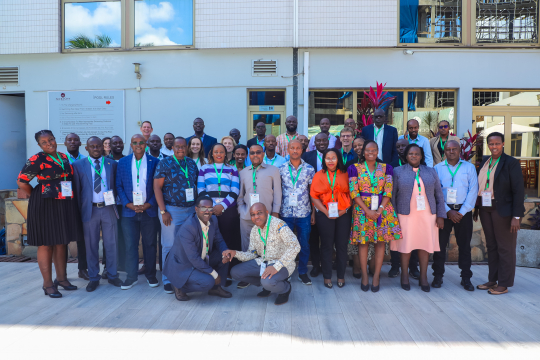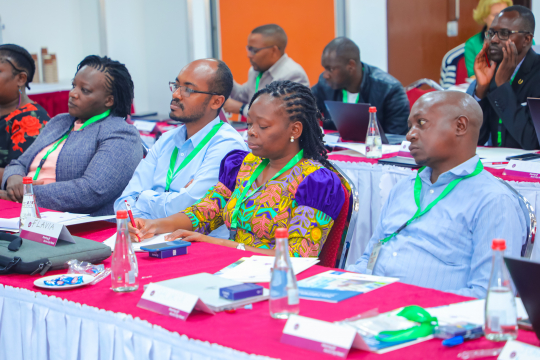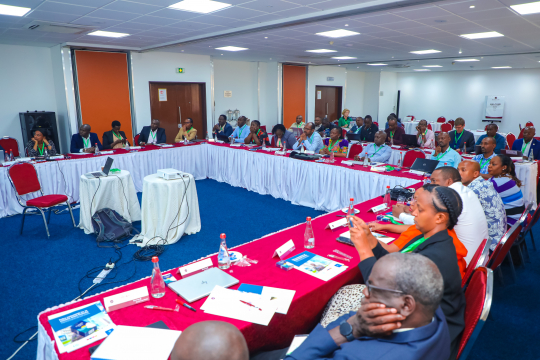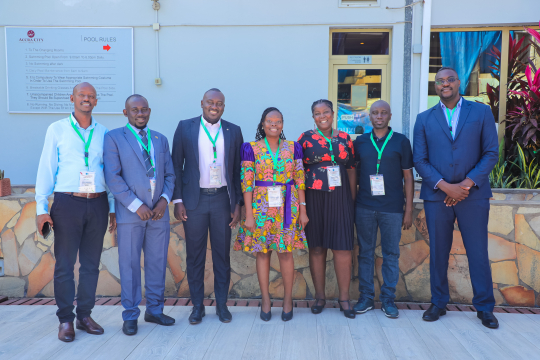More than three billion people globally rely on biomass fuels, such as coal, charcoal, and firewood for cooking and heating. EfD’s IGE program, a capacity development program that targets civil servants in East Africa, is currently focusing on this issue. The policymakers from Uganda and the researchers in their local support team are a good example of working together to address this problem from several angles.
The civil servants participating in the Inclusive Green Economy in Practice (IGE) program, so-called IGE fellows, in the 2023/24 cohort, focused their work on sustainable energy transition and in particular reducing biomass dependency. The reason for this focus is that biomass dependency is among the most urgent development challenges in Africa. It includes for instance health problems, deforestation, biodiversity loss, climate change, poverty, a burden on women and children who spend time collecting firewood instead of going to school or doing paid work, and security issues. In Uganda alone, the air pollution caused by firewood burning causes the premature death of around 13,000 people.
Has been on the agenda for decades
However, this problem has been the topic of very many studies and policies over many decades. There are tough hurdles to overcome: Costs for clean cooking technologies, availability of alternative fuels, traditions, and perceptions (that is, that electricity and gas are dangerous to use and that the food will not taste as good) are some of them.
The Ugandan support team authored several op-ed articles in 2023 to highlight the dangers of biomass dependence. They also conducted a study with focus groups to learn about peoples’ perception of a transition to cleaner energy which resulted in a policy brief, now published on the EfD website. Increasing the knowledge about biomass dependency among policymakers and the general public is one cornerstone in addressing the problem.
The IGE model calls for dialogues between policymakers and researchers to match policy needs with scientific evidence. In Uganda, the support team and the 2023 IGE fellows organized two formal policy dialogues in April and July. These attracted several stakeholders including among many others, IGE fellows, other officials from government ministries, departments, and agencies, researchers, NEMA,
Realistic solutions and communication are key
The IGE fellows attended several online trainings coordinated by the EfD’s Global hub. They also attended a one-week training workshop in Ghana in October where they exchanged knowledge and experiences with the IGE fellows from Ethiopia, Kenya, Rwanda, and Tanzania, the support teams, and other EfD researchers.
Peace Kaliisa from the Ministry of Infrastructure, Rwanda, welcomed this opportunity to meet with researchers and discuss the problems face to face to bridge the research-policy gap:
“The challenge is that we can often not relate to the research. The researchers must look at solutions that are easy to implement, relate to ordinary people, and communicate it understandably.”
Several positive outcomes
The team’s (IGE Fellows´ and EfD researchers´) activities have led to several positive outcomes. For one thing, the president of Uganda issued an executive order to ban the production of commercial charcoal.
“Our IGE fellows from the Ministry of Energy and Mineral Development participated in drafting a cabinet memo that led to the issuing of a presidential executive order restricting the production of charcoal,” said Peter Babyenda, Policy Engagement Specialist, EfD Uganda.
In addition, the Ministry of Energy and Mineral Development rolled out the distribution of 1 million free LPG (Liquid Petroleum Gas) cylinders and cooking plates to demonstrate to the public that it is possible to move away from biomass dependence.
“The two IGE fellows from the Ministry of Energy and Mineral Development, Tony Joshua Mwesigwa and Simon Peter Ssekitoleko played an instrumental role in designing this plan and ensuring that it is implemented,” said Peter Babyenda.
Just supplying cooking devices doesn’t solve the problem though, when fuel is hard to find, so the IGE fellows wrote a concept report on the distribution of free LPG, the construction of LPG refineries across the country, and the need for cost-effective subsidies. The planning department where IGE fellow Tony Joshua Mwesigwa works suggested a model for a reduction in energy tariffs to encourage the shift to the use of electricity to cook.
Tony Joshua Mwesigya commented that ”the IGE course and IGE support team were instrumental in guiding us to come up with the above proposals. Some of them are already being implemented such as reduction in electricity tariff, distribution of free LPG, and the review of energy policy in the country”.
Facts about the IGE program:
The IGE program, arranged by EfD, is a program for capacity development in five African countries: Ethiopia, Kenya, Rwanda, Tanzania, and Uganda. About five high-level civil servants per country, 25 people in all, are enrolled each year in the current program, running from 2023-2027. After finishing the program, they are part of an alumni network, aimed at sharing experiences and knowledge on best practices. The program is funded by the Swedish International Development Cooperation Agency, Sida.



